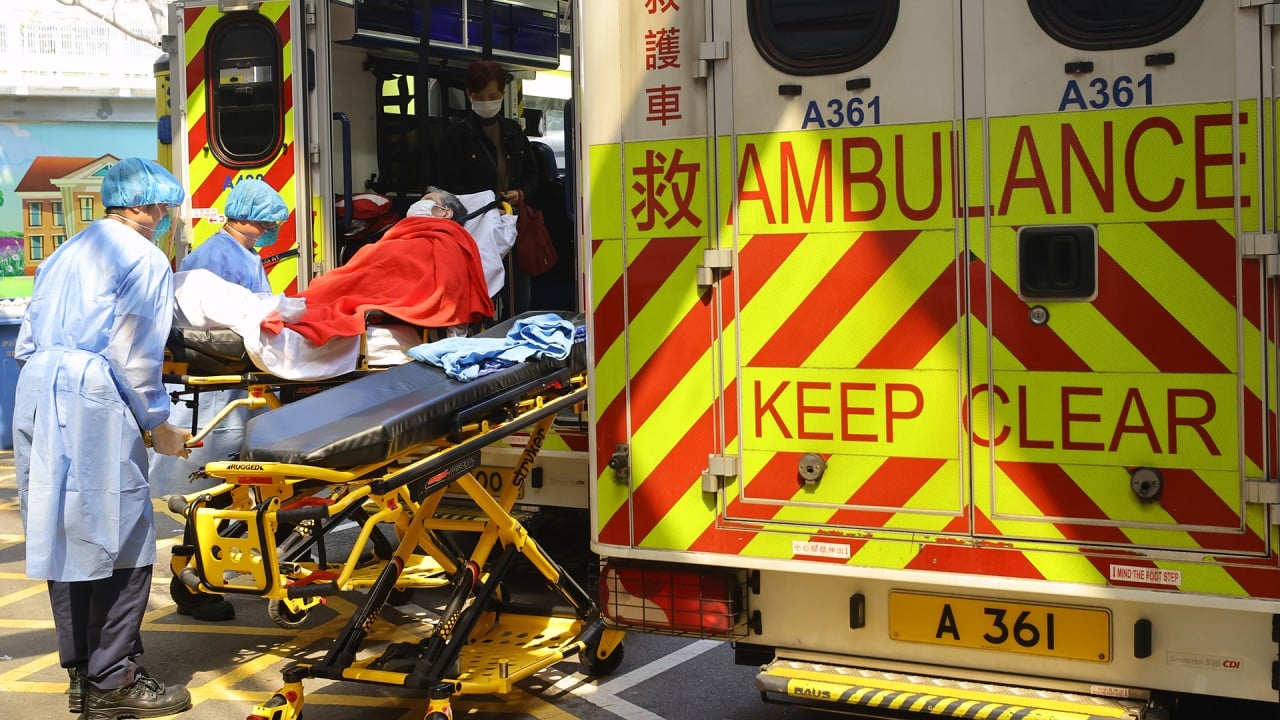
Coronavirus: Hong Kong’s elderly left it late to get Covid-19 shots, now worried families fear time is running out as cases soar, deaths mount
- Worsening fifth wave, which first hit the city in late December, has affected homes for the elderly badly, with confirmed cases in 580 facilities
- Vaccination rate among the elderly remains relatively low compared with other age groups
But the care home did not arrange the Covid-19 shots in time and now Lau’s father, who is in his 90s, has caught the disease and is battling for his life after being admitted to hospital two weeks ago.
A closer look at Hong Kong’s latest rules on Covid-19 testing, quarantine
“Back then we kept asking them to let my father take the vaccine. But at the start of the vaccination scheme, there were many worries about the elderly dying when they got jabbed, so many homes were hesitant for them to take the vaccine,” Lau, 54, said.
“Of course I regret this, I wanted my father to get vaccinated earlier so he wouldn’t die. But now it is too late.”
The worsening fifth wave, which first hit the city in late December, has affected homes for the elderly badly, with confirmed cases in 580 facilities and 2,900 residents and 865 staff infected, according to health authorities.
Hong Kong confirmed a record 34,466 cases on Monday, taking the city’s tally since the start of the pandemic to 205,780.
Authorities revealed that another 124 infected residents had died on Monday, taking the overall tally to 851. According to an analysis, 67 of the latest fatalities involved unvaccinated residents, while 10 had received one shot and another 10 had taken two. Forty-nine of those who were residents of care facilities.
Hong Kong leader calls for calm after residents panic over possible Covid-19 lockdown
For inoculated residents aged 80 and above the death rate is 0.27 per cent versus 4.34 per cent for the unvaccinated.
Grace Li Fai, chairwoman of the Elderly Services Association, said many people were only just beginning to worry about aged family members dying of Covid-19 as more fatalities among the older generation were reported daily.
Previously they were mostly apprehensive about the vaccines, she said.
“Many families are now requesting to get their elderly family members vaccinated,” Li said. “But now homes for the elderly have been hit so hard, how do we arrange for doctors to help? They may not be available at this moment.”
Lau, the care worker, said her bosses had been asking her to resume duties at another home for the elderly she worked at, even though she is infected.
“My boss tried to threaten me by saying that if I don’t go to work, he will hire someone else. I think it’s very unfair on me,” said Lau, who has a fever and sore throat.
She insisted on staying home and got an isolation order from authorities.
“This is risky for the elderly, as a boss they should prioritise the well-being of their residents first. But instead, they just ask infected staff to continue working,” she added.
Who is Liang Wannian, the man Beijing sent to help Hong Kong’s Covid fight?
Meanwhile, the Hospital Authority started a pilot scheme on February 21 to provide free Chinese medicine consultations and treatment to infected elderly residents of care homes and employees.
Under the scheme, registered practitioners from local universities, non-government organisations, the authority’s Chinese Medicine Centres for Training and Research and others offer consultation and treatment service via video calls remotely or by home visits to eligible residents and personnel.
Each recipient can receive up to three consultations along with five doses of Chinese medicine each time which are delivered to the homes.
As of Sunday, practitioners from Baptist University and the Hong Kong Registered Chinese Medicine Practitioners Association had provided nearly 300 consultations for elderly residents and staff, aged 63 to 103, from 22 care homes.
Professor Bian Zhaoxiang, associate vice-president (Chinese medicine development) at Baptist University, on Monday said most of the recipients were patients with mild to moderate symptoms, including coughing and a fever. He said their condition improved after taking Chinese medicine.
But he said Chinese medicine was not suitable for those with severe conditions, including a fever of above 38.5 degrees Celsius and an oxygen level lower than 94 per cent, and they should instead go to hospital.
Bian said unlike younger patients, many elderly residents were on medication for other conditions. Doctors had to be aware of their medical history so as not to cause medicines to work against each other, and would usually recommend a one- to two-hour break between taking Chinese and Western types.
“We have seen that Chinese medicine has a good effect on most of the patients, whose conditions have improved,” he said. “Chinese medicine is suitable for infected people with mild to moderate symptoms, and it has good clinical effects.”
Rowena Wong, chief manager (Chinese medicine) of the authority, said the city’s more than 700 care homes for the elderly could apply to the scheme and she expected it to deliver 10,000 consultations.
“Care homes for the elderly have seen severe outbreaks of infections recently. Many of their residents and staff are infected and they need help,” she said, adding the authority might consider extending the service to cover other groups.



